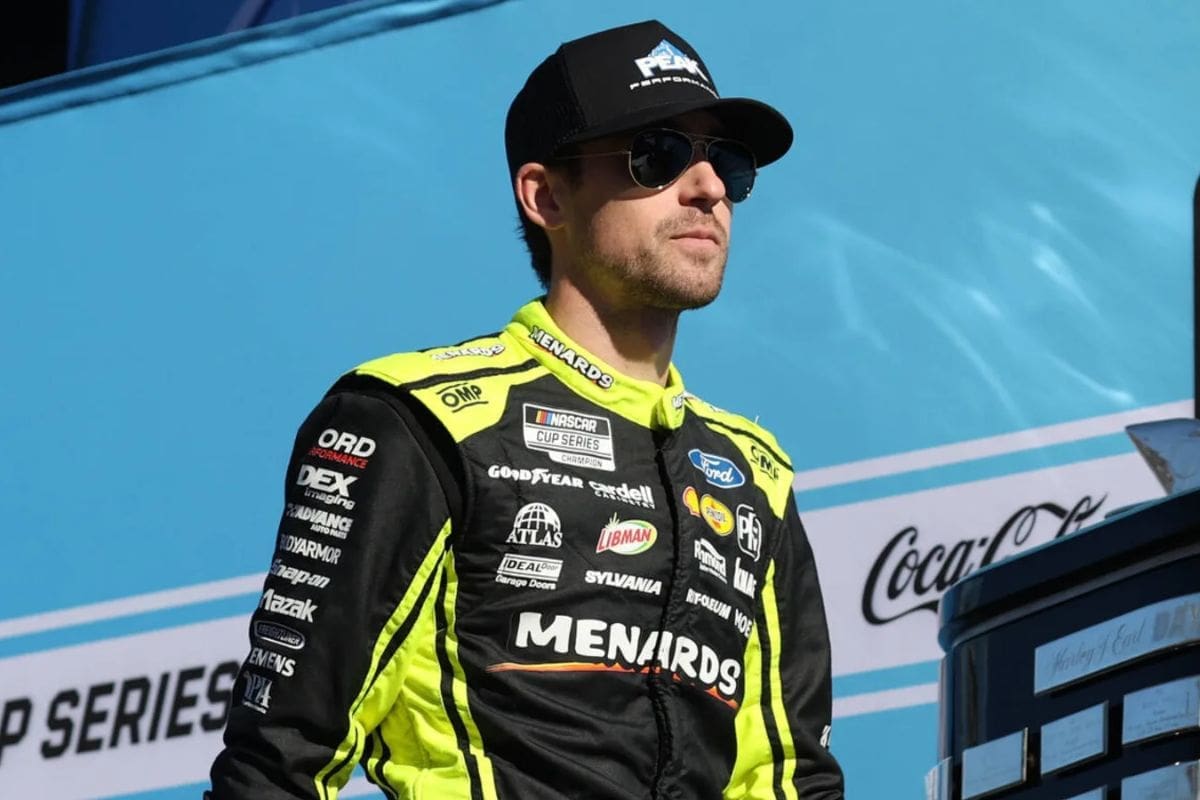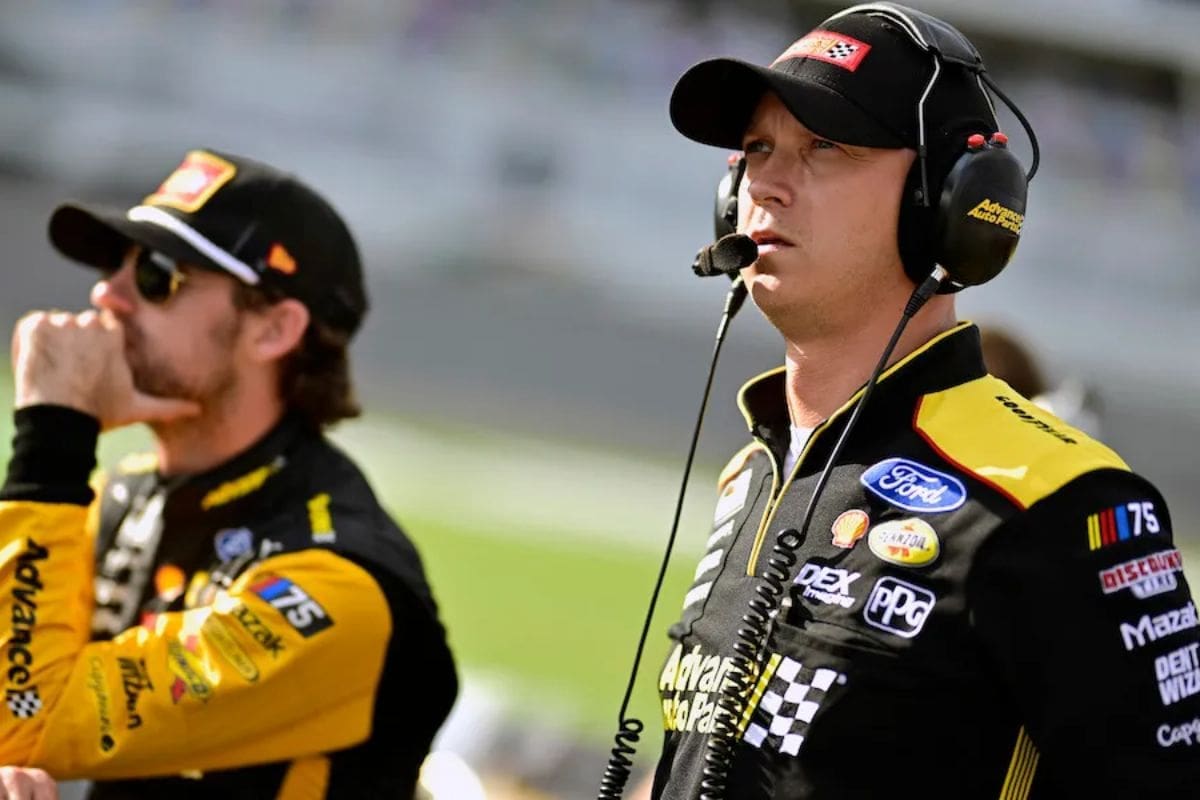Ryan Blaney’s Crew Chief Admits Team Penske’s Weakness: Ryan Blaney‘s recent win at Pocono Raceway not only highlighted his driving skill but also emphasized a revealing confession by his crew chief, Jonathan Hassler, about Team Penske‘s core vulnerabilities. Hassler’s open evaluation indicates a crucial moment for the team as they prepare for the summer races, highlighting a tactical revamp to tackle their shortcomings. This straightforward introspection, coupled with a proactive strategy to improve their methods, indicates a deliberate effort to capitalize on their recent win.
Key Highlights
- Jonathan Hassler acknowledged Team Penske’s recent performance struggles and areas needing improvement.
- Hassler’s strategic pit decisions at Pocono were crucial for overcoming performance challenges.
- The team’s victory at Pocono boosts confidence and addresses previous weaknesses.
- Team Penske is dedicated to refining strategies and maintaining a competitive edge.
- Continuous improvement and addressing shortcomings are top priorities for Team Penske’s summer performance.
Race Recap and Team Effort
Despite the inherent challenges of Pocono Raceway, Ryan Blaney‘s victory in The Great American Getaway 400 was a proof of individual skill and tactical team effort, particularly the pivotal pit strategies arranged by crew chief Jonathan Hassler. The unique triangular layout of Pocono, often dubbed the ‘Tricky Triangle,’ poses notable challenges for drivers, making overtaking a formidable task.
The race dynamics at Pocono necessitate a careful approach to pit stops, as track position is often gained or lost in the pits rather than on the track. Blaney’s team, led by Hassler, executed their pit strategies with accuracy, ensuring that Blaney was consistently positioned to capitalize on opportunities. The synergy between driver and crew was evident; every decision made on pit road had to be flawlessly timed and executed to maintain or improve Blaney’s position.
In an environment where even the slightest error can lead to significant setbacks, the unity of Team Penske‘s efforts was clear. From the tire changers to the fuelers, every member of the pit crew performed their roles with precise accuracy, contributing to the overall success. Moreover, Blaney’s ability to communicate effectively with his team, providing real-time feedback, allowed Hassler to make informed decisions under duress.
Impact of Jonathan Hassler’s Strategy at Pocono
Jonathan Hassler’s strategic expertise at Pocono Raceway was pivotal in overcoming Team Penske‘s season-long struggle with speed on mile-and-a-half tracks. The calculated moves arranged by Hassler not only alleviated the inherent performance deficiencies but also capitalized on the intricacies of Pocono’s unique track layout. His detailed planning and execution forced seven-time Pocono champion Denny Hamlin into a defensive position, allowing Ryan Blaney‘s No. 12 Ford Mustang to claim victory on a course typically dominated by Toyota.
Hassler’s approach was a masterclass in utilizing pit strategy to counteract mechanical limitations. Recognizing the challenge of matching raw speed, he prioritized optimal tire management and precise fuel calculations. This foresight was crucial in maintaining Blaney’s competitive edge throughout the race, especially in the critical final laps. By timing pit stops skillfully, Hassler guaranteed that the No. 12 car had the necessary resources to withstand Hamlin’s late-stage advances.
View this post on Instagram
Key Moments and Strategy Execution
Building on Jonathan Hassler’s clever plan, the key moments and careful execution during the final 44 laps at Pocono Raceway represented Team Penske’s tactical expertise. Ryan Blaney’s ability to capture and maintain the lead was no mere coincidence but rather a peak of precise planning and seamless execution.
With 44 laps remaining, Blaney’s No. 12 Ford took the lead, displaying the team’s skill in timing and positioning. The calculated decision to focus on track position proved vital. Blaney and Hassler recognized the car’s inherent speed advantage, allowing them to prioritize staying ahead rather than engaging in potentially risky moves. This clarity in their approach highlighted a deep understanding of their vehicle’s capabilities and the track’s unique demands.
Key moments included Blaney’s flawless driving of Pocono’s challenging turns and his skilled management of tire wear and fuel. By ensuring top performance throughout the final laps, Blaney minimized any opportunities for competitors to capitalize on potential weaknesses. Hassler’s real-time adjustments and Blaney’s precise driving worked in harmony to maintain an unassailable lead.
Additionally, the team’s pit stop plan was executed with impeccable timing, ensuring that Blaney returned to the track without losing vital seconds that could have threatened their position.
Jonathan Hassler’s Post-Race Reflections
Reflecting on the race, Ryan Blaney‘s crew chief Jonathan Hassler acknowledged the vital importance of the win in enhancing Team Penske‘s momentum and addressing their intermediate track performance weaknesses. Hassler’s comments to SiriusXM NASCAR Radio highlighted a significant turning point for the team, particularly as they handle the challenging stretch of the racing season. The victory on a mile-and-a-half intermediate track, a known area of vulnerability for Team Penske, signifies more than just a win; it is a strategic uplift in confidence and capability.
“As we look toward the end of the season, one of our weaknesses this year has been a mile-and-a-half intermediate program. To get a little bit of speed, a little bit of momentum on this kind of track is really good for us.” – (Hassler)
Hassler pointed out that the intermediate program has been a consistent challenge for the team this year. This acknowledgment is not simply a reflection of past struggles but an analytical recognition that overcoming such deficiencies is necessary for sustained competitiveness. The win, hence, serves as a key data point in their performance trajectory, indicating that the adjustments and strategies implemented are yielding tangible results.
“Yeah, we talked. We set a goal as a team to be the team of the summer. I think certainly we’re turning that corner and starting to do it.” – (Hassler)
Hassler emphasized the significance of timing in their momentum shift, noting the team’s collective goal to dominate the summer. This ambition to be ‘the team of the summer’ shows a proactive mindset directed towards peak performance during a pivotal period. The recent win can be seen as an affirmation of this goal, suggesting that Team Penske is indeed ‘turning that corner’ as Hassler mentioned.
Team Penske’s Overall Success at Pocono
Achieving an impressive milestone, Team Penske‘s recent NASCAR and IndyCar victories highlight their dominance across various racing disciplines. This remarkable accomplishment emphasizes the team’s strategic insight and operational excellence, further solidifying their position as a powerhouse in motorsports. The weekend proved particularly victorious, with Scott McLaughlin securing his first career oval win on Saturday, followed by Will Power’s success in Iowa on Sunday.
These dual victories are indicative of Team Penske’s capacity to adapt and excel in diverse racing environments. McLaughlin’s victory is not just a personal milestone but a display of the team’s ability to nurture and cultivate talent in various racing styles. His performance on the oval circuit symbolizes the strategic investments in training and technology that Team Penske consistently prioritizes.
Will Power’s subsequent win in Iowa reinforces the depth of skill and preparation within the team. Power’s expertise and accuracy on the track mirror the careful planning and execution that Team Penske is renowned for. Such wins are not isolated occurrences but rather the result of a well-structured support system involving engineering expertise, driver skill, and tactical innovation. Blaney, happy with the result, spoke after the race.
“I feel like the last two months, we’ve been spectacular. Penske sweep!” – (Blaney)
Nevertheless, these victories should not overshadow the areas where the team aims to improve. Recognizing weaknesses, as Ryan Blaney’s crew chief recently mentioned, is an important step in maintaining their competitive edge. By addressing these shortcomings, Team Penske can not only uphold but also improve their dominance in both NASCAR and IndyCar circuits. Team Penske Competition Director Travis Geisler spoke after the race in Pocono,
“It’s great to have Ryan back in here. It’s a really important win for him and his career. For him to be able to celebrate it now as a champion is kind of like coming in full circle. Obviously, a lot of good momentum going into next week. Which is a huge focus for our group and it’s obviously a great place to be good at when you are going to Indy next.” – (Geisler)
News in Brief: Ryan Blaney’s Crew Chief Admits Team Penske’s Weakness
Jonathan Hassler’s acknowledgment of Team Penske‘s weaknesses highlights a key commitment to ongoing improvement. The proactive approach to refining strategies and addressing shortcomings reflects a broader goal to optimize competitive performance.
By leveraging recent successes and maintaining a focus on key areas for growth, Team Penske aims to solidify its position within the NASCAR circuit. This open self-assessment and dedication to progress have the potential to drive substantial advancements during the summer races.
ALSO READ: Ryan Blaney Reveals Drivers Struggle:”I feel like a lot of drivers and athletes have like a bipolar”




